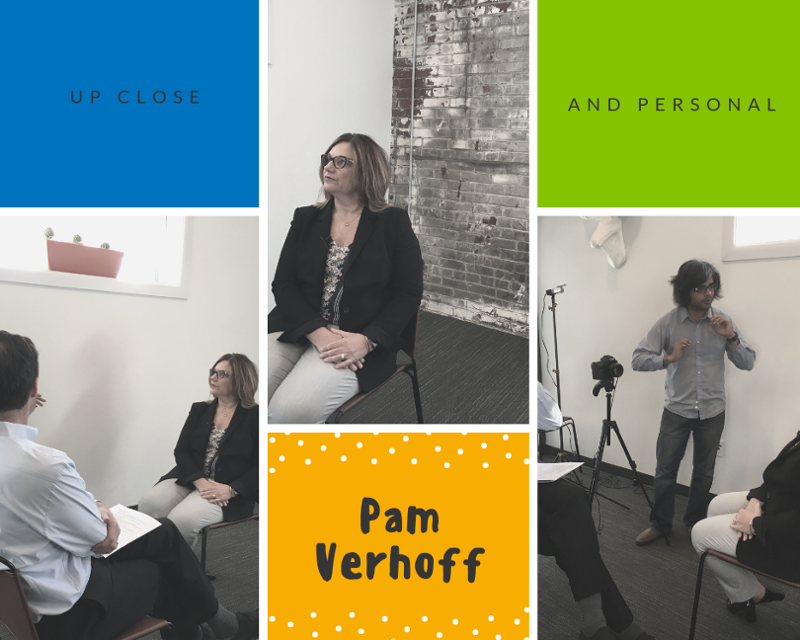
For over 20 years, Pam Verhoff has built businesses and helped clients build effective recruitment solutions. She spent five years as a Sr. Vice President leading Aon Consulting’s human capital practice and the next five years building The Right Thing, with Tim Oyer before it was acquired by ADP. She joined The Advanced Group in 2011 as Vice President of Strategic Operations in which she was responsible for the HR, Operations, Training, Marketing and IT teams supporting the Advanced Group businesses. In January 2016, she took on the role as President of Advanced RPO. She attributes her successes to surrounding herself with the right people and prioritizing a values-driven culture.
Pam is a thought leader and an advocate for recruitment process outsourcing. She serves on the Recruitment Process Outsourcing Association Advisory Board providing strategic direction for the organization.
She was recently interviewed by fellow RPOA Advisory Board member, Jason Krumwiede with Broadleaf Results, around Verhoff's work, life, and career in RPO. The following is a script of the conversation.
Jason Krumwiede: How would you define RPO?
Pam Verhoff: I would define RPO as a very strategic partnership with the customer, where clients see talent as a real strategic advantage. They understand they’re in “X business” and recruitment may not be their core competence, and therefore they look to a PPO provider where recruitment is a core competency and know that they will deliver talent into their organization.
What would you say RPO is not?
RPO is not a cheap way to deliver talent acquisition for an organization. It is not an out for the TA (talent acquisition) or the HR (human resource) team. It's not just somewhere to place blame if things are not going well, and honestly, things don't always go well, but a true partner is one that works through those challenges with their provider and ultimately both come out on the back end, you know much better as organizations.
Do you think of yourself as a contingency agency?
No. Many people confuse the two and they're very different. In an RPO partnership, we have an exclusive relationship with that HR department with the TA function and we’re ultimately accountable to fill all of the requisitions within that, statement of work, if you well. Versus contingency firms are ones that, you know, you are one of many trying to fill specific openings. I would say another very significant difference is the fact that with a contingency search the candidates that are sourced and vetted are candidates of the staffing agency, versus in an RPO partnership those are candidates the Client themselves own those candidates. They go into their database. Very very different.
How does an RPO represent themselves to candidates?
A candidate may not even know that we are an outside provider providing the services for the customer in an RPO partnership because we are going to market as the customer. Now if they ask, you know, “Pam, are you a recruiter with XYZ client?,” I would then say “I partner with XYZ client.” But the candidate may not know.
What are some of the misconceptions about RPO?
I would say the first misconception that comes to mind is that it's simply for high-volume hourly roles. I think if I look back that's really where it started, and an organization saw tremendous value there. However, it has really evolved and an RPO provider can be very successful in filling all roles for an organization, exempt level and up as well.
Why do you think PRO isn’t as well known among some business & talent acquisition leaders?
I think in addition to the fact that they may not have experience doing it, organizations look at talent acquisition as a somewhat tactical function or if they're not thinking real strategically, they then are comfortable with the status quo and always approaching it as they always have. I will say, I think with the talent market the way it is today, more and more organizations are looking at and understanding they need to do a better job attracting the right talent into their organization and they are starting to look at other options.
How long have you been a part of the industry?
I've actually been in RPO for the majority of my career, which I hesitate to say how many years that's been, because I know I look 40, right? It's been over 25 years and I was part of an RPO organization before it really had the name RPO which has been fun for me to really see that, you know the changes in how we operate today versus 25 plus years ago.
How did you start your career in RPO?
It was not intended. My story's interesting and that at the time I worked for an agency, staffing agency, which also had an executive search function, separate department, if you will, and we had a situation with a customer that it wasn't a perfect fit for either of those. It was high-volume, but they were higher-level roles. They weren't hourly, and they weren't temporary. And so we knew that we as an organization could do it so we cuddled together some individuals to lead the project team up, which I was one.
This was very early in my career and we were able to deliver, you know, 250 hires for a customer, they were all direct hire and after doing that successfully decided there could be a business model here.
And we really, at that time, focused on the hourly level roles because, you think about back in the day if you were working with an Executive Search firm or a recruiter on the salaried side, you were courted, if you well. There were expectations as you were going through that process. In the hourly side, how many times did you hear candidates say, “I placed an application there, never heard anything.” So our philosophy, at that time, was, “we were going to bring that same level of service into the hourly hiring realm” and long and behold started a business and the rest is history.
What makes you passionate about RPO?
We make such an impact with our customers and we provide such an opportunity for recruiters. I often say, recruiting within an RPO firm is like recruiting in dog years because you have access to customers and so many different industries and you naturally just learn so much and very quickly and develop very solid skills. So, you know, it's the combination of both, knowing that you're making such a difference for your customer while developing the team. For me personally, there's just nothing more. I can't think of anything that would be more satisfying.
How would you describe your work to your mom or dad?
How have I for the last 25 years (laughs)? In simple terms, I usually start by saying we do recruiting, and then if that resonates with them, which some it does and others it doesn't, I then go on to say, we actually act as the recruitment function for organizations. I think typically that simple statement is one that individuals that aren't in the industry understand and then, you know, go forth and make their own assumptions around.
What do you love about your team?
The team that I have is, I mean they're as passionate about RPO as I am. And so I tell them, we have an all-company call once a month, and I always end it, not necessarily intentionally, but let them know, they make my job really easy. They're very experienced, very good at what they do. In addition to being great recruiters, they have the ability to develop relationships with hiring managers, which is almost equally as important as the actual recruiting of talent. And they just really continue to knock it out of the park, and as I said, they make my job as a leader very easy.
Complete this sentence, “If I wasn’t doing RPO, I would be…”
If I wasn't doing RPO, I, first of all, I think what I would be lost and I would hope that I could just be on a beach enjoying life. I really can't, if you're asking, what other careers might I be in it's hard to imagine simply because this is what I've done for the majority of my career.














